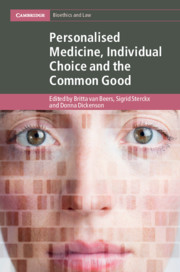‘This volume illuminates the fundamental tension between the individualistic promises of personalized medicine and the demands of social justice. Moreover, it follows this moral fault-line well beyond the territory of applied human genomics, to show how it runs through biomedical practices ranging from infertility treatments, umbilical cord blood banking, and organ transplantion, all the way to how we care for people with Alzheimer Disease and use personal fitness apps to care for ourselves. In the process the volume nicely illustrates why applied genomics cannot expect to outrun this tension by reinventing itself as a ‘precision' approach to resolving public health inequities. By demonstrating the ubiquity of the ‘me/we' tension in the ways our society thinks about and pursues health, the book challenges the reader to consider personalized medicine and ‘precision healthcare' as exemplars of rather than alternatives to modern biomedicine's conventional set of ethical commitments.'
Eric Thomas Juengst - University of North Carolina School of Medicine
‘This important book Personalised Medicine, Individual Choice and the Common Good intervenes in one of the most important debates of our time - and that is access to health care. This is a global matter and it touches virtually every area of human need and desire from organ transplantation to assisted reproduction. This book confronts both our desires and demands and explores the costs of giving the people what they want.'
Michele Goodwin - University of California
'This rich collection of essays is a tribute to the generative powers and explanatory scope that co-editor Donna Dickenson's 'Me Medicine versus We Medicine' framework provides. The volume's authors and editors offer trenchant insights into the social, cultural, and market dynamics that underlie the hypertrophy of practices and products shaped by 'Me Medicine', piercing inflated promises and carefully mapping the repercussions for individual patients and for our commitments to public health. Not least, they also chart a hopeful course for future efforts to better balance individual choice and the common good.'
Marcy Darnovsky - Center for Genetics and Society
'The contributors to this volume largely offer a counter-narrative to the hype [about personalized medicine]. Assessing personalized medicine from legal, public health, human rights, feminist, technological, ethical, economic, political, and philosophical perspectives, the authors unpack its benefits and potential harms. In doing so, most of them deploy to good effect an incisive heuristic advanced several years ago by Donna Dickenson that divides health research and care into two approaches dubbed 'We Medicine' and 'Me Medicine.''
Gina Maranto
Source: Biopolitical Times
'The multidisciplinary perspectives offered in this book will make it of interest to a variety of audiences, especially bioethics, law, and philosophy students and academics. It will also be of interest to other scholars studying the intersection of medicine, society, and politics, such as political scientists and communications experts.'
Maya Sabatello
Source: Hastings Center Report



